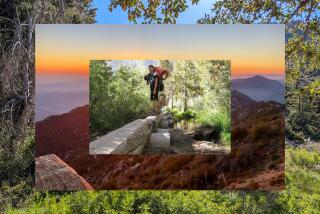A Few Ways to Ensure Kids’ Safety at Camp
- Share via
About 5 million children, most between the ages of 8 and 14, will attend day and sleep-over camps this summer. But will they remain healthy? Will they be safe? Are special precautions necessary?
Any safety fears will probably prove groundless, according to pediatricians and other experts. Kids at camp are as safe, perhaps safer, than those at home, they contend.
“The most common injuries (sustained at camps) are relatively simple ones,” said Bob Telleen, YMCA associate director for camping and environmental programs who has directed camps for 25 years. Typical problems, he said, are foot injuries (usually resulting from inappropriate shoes), insect bites, skin rashes, sprained ankles and, at camps with water activities, swimmer’s ear.
And the risks of accident and injury decline, experts said, if parents choose an accredited camp, obtain a thorough pre-camp physical exam for their children and communicate any special needs effectively to camp staffs.
More than 2,000 camps, most of them for children and young people, are accredited by the American Camping Assn., a not-for-profit education group based in Martinsville, Ind., said ACA associate director Patricia Hammond. In all, there are about 8,500 day and resident camps in the United States, according to ACA estimates.
Accreditation standards vary, depending in part on whether the camp is for day or sleep-over visits. For example, Hammond said, to receive accreditation, day camps must have someone with first-aid training on the premises at all times and a doctor or nurse on call. Resident camps must be visited by a doctor or nurse each day and must also have a first-aid-trained employee on site at all times, although the majority of resident camps maintain a full-time doctor or nurse, Hammond said.
In addition, “the camps must have some sort of emergency transportation to a hospital available,” Hammond said. “That could mean calling 911. But rural camps might have their own vehicles or might have a contract with a local emergency squad.”
Camps applying for accreditation are evaluated by trained ACA volunteers while they are in operation and are visited for re-accreditation at least once every three years. Evaluations center not just on health care but also on facilities, personnel, administration and programs.
While selecting a camp, experts suggest that parents ask a few questions:
* What’s stocked in the first-aid center?
* If there’s a health problem, when and how are parents contacted?
* What are the emergency procedures?
* What are the qualifications and training of the camp staff?
Most ACA-accredited camps require a pre-camp physical. (Even though such an exam is strongly recommended by ACA, it is not required for accreditation.)
Parents should be sure that their child’s pre-camp physical is more than a cursory once-over, said Dr. Clifford Rubin, a Beverly Hills pediatrician and UCLA clinical associate professor of pediatrics who completes many such examinations.
Rubin recommends that children be given a complete physical examination, including blood pressure, heart rate, hearing and vision testing. He also provides nutritional counseling, advising children on how to eat nutritiously at camp. Immunizations should be updated, if needed, especially tetanus.
Where Lyme disease, the tick-transmitted inflammatory disorder, is prevalent, Rubin said precautions should be taken.
He instructs children to wear hats, to use insect repellent and to keep their limbs covered, especially on hikes, to help prevent attracting the tick.
Parental communication with the camp’s health staff is also vital. Some parents try to hide certain health histories--depression and hyperactivity are two examples--said the YMCA’s Telleen. But it’s really best for the child to give an honest briefing to the camp staff, should he or she have special health needs and history, Telleen said.
For information on accredited camps, contact the American Camping Assn., 5000 State Road 67 North, Martinsville, Ind. 46151-7902; tel. (317) 342-8456. For a free directory of camps in Southern California, call or write the Southern California office of the American Camping Assn., 22231 Mulholland Highway, 212, Calabasas, Calif. 91302, (818) 223-9232.
More to Read
Sign up for Essential California
The most important California stories and recommendations in your inbox every morning.
You may occasionally receive promotional content from the Los Angeles Times.












